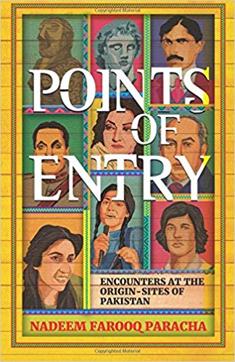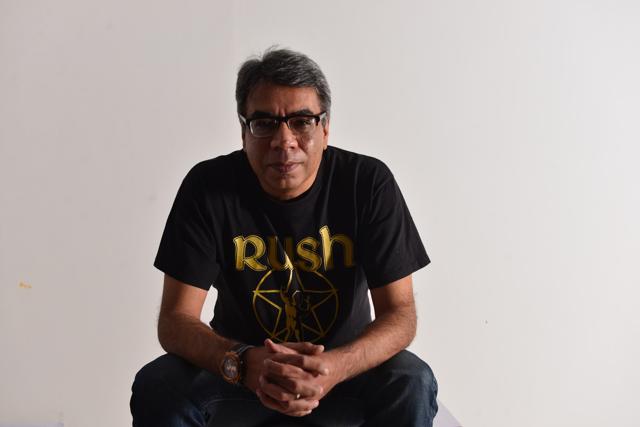Review: Points of Entry; Encounters at the Origin-Sites of Pakistan by Nadeem Farooq Paracha
A nuanced collection of essays on the history, culture and politics of Pakista

A few pages into the timeline at the beginning of Nadeem F Paracha’s Points of Entry; Encounters at the Origin Sites of Pakistan, you put down the book to check out Koko Korena on Youtube. You also make a mental note: ‘Watch Jago, Hua Savera, Pakistan’s first art film scripted by Faiz Ahmad Faiz.’ This impulse to understand what the author is writing about through an online immersion in the cultural artefact he’s discussing reasserts itself every few pages, which means it takes longer to read this 160-page book than it usually would. Since the artefacts Paracha holds up are simultaneously familiar and strange, it often feels like you’ve slipped through the breach in The City and The City, China Mieville’s weird fiction novel, where characters are taught to ‘unsee’ things in a space that might be geographically adjacent, even shared, but exists in entirely different cultural dimensions. This is what makes Points of Entry a rewarding read for an Indian accustomed to seeing Pakistan only as the place from where friends’ grandparents fled clutching babes in arms and as a problematic neighbour forever flashing the evil eye in this country’s direction. “Can we all just get along?” Rodney King wondered during the LA riots of 1992. It’s a question that often pops up in the India-Pakistan context. After reading Paracha, you could say the two nations get along and also don’t because they are similar while also being completely different.
Much of this difference has to do with the happy chance that allowed India to be steered by men of the calibre of Nehru, Patel and Ambedkar who understood its great diversity and the impossibility and undesirability of an imposed identity. Unfortunately for Pakistan, its founder Muhammad Ali Jinnah who, in the author’s words, described the country as “a Muslim-majority entity whose polity and state would be inspired and driven by a progressive, multicultural, modernist and democratic interpretation and understanding of Islam” died in 1948 before the nation’s character could be shaped according to those ideals. Of course, a secular Indian (that endangered species in what is becoming, in Shashi Tharoor’s apt term, “Hindu Pakistan”) would point out that stressing on a specific religious identity immediately makes a nation susceptible to the kind of troubles that Pakistan has encountered. But that is not the focus of this piece.

Paracha’s writing is smooth; quite unlike what you imagine Lion’s Whisky, which the author and his friends swig during a stopover in 1980s Larkana, tastes like. On the surface, his pieces seem to be talking of, say, a trip to Mohenjo-daro, or the band Vital Signs. But they are about larger things -- identity, how individuals and nations are shaped by music, poetry and popular culture, and history.
A chance meeting with Tibetans in search of the mythical Dhanakosha lake, believed to be the birthplace of Buddhist sage Padmasambhava, leads him to a spot near Lower Dir “bone-dry and covered with shrubs” which perhaps once held the lake. He writes of the conquest of Sindh by Arab commander Mohammad bin Qasim in 8 century CE and how that event has been repurposed to invent the idea that South Asian Pakistan has Arab roots. To a non-Pakistani this might seem absurd but really, it is similar to the brahamanical origin myths that various non-Hindu communities across India hold dear.
The essay on the Siddhi population of Karachi’s Lyari is superb and the reader is astounded that these Afro-Pakistanis have maintained familial links with Africa. The excellent piece on Karachi’s Goan Christian community recalls Mumbai’s late legendary Jazzy Joe Pereira, who spoke of arriving from Pakistan “after independence, like a refugee”. Like Jazzy Joe, who arranged music for many Hindi film composers, Goan Christian musicians in Karachi were an integral part of the Urdu film industry, which was sadly mauled in the 1980s by the twin onslaughts of Zia ul Haq’s Islamization drive and video piracy.
The essay on Jhuley Lal-Udero Lal, the saint beloved of both Hindu and Muslim Sindhis is interesting but it is Paracha’s rumination on Sufi music while travelling down the Indus that is particularly moving. Here he is on Yakub, the owner of the ferry, who sang Sufi songs, including Bulleh Shah’s Bullah Ki Jaana Mein Kaun, as they drifted downriver:
Yaqub had sailed up river Indus towards the KP province so that he could visit a Sufi shrine in one of the towns there. As he was about to enter the place, a huge explosion flattened the place. Dozens of devotees were killed. The explosion was caused by a suicide bomber belonging to an extremist outfit. So, Yaqub, the sailor of the ancient river Indus, the singer of folk songs of spiritual love and peace, befittingly took his last breath at the shrine of one of his beloved Sufi saints – killed there by men full of spite, hatred and a sickness of both the mind and the soul.
Read more: Roots | The Goan theory of relativity
Layered and powerful, Paracha’s writing takes you beyond the fundamentalist mobs and the bazaar bomb blasts, the usual clichés, to present a nuanced picture of a complex nation caught, as the book flap suggests, between the modernist impulse and the theocratic one.
Now that middle class Indians aren’t quite so smug about freedoms, about the nation’s supposed liberal core and about the invincibility of a certain idea of India (yes, the one that both inspired and was inspired by Manmohan Desai’s Amar, Akbar, Anthony), this is also a book that makes the Indian reader think about her own country, of the many ways the two fractious south Asian siblings are similar, and the numerous ways in which they are not, and what that might mean for both.






